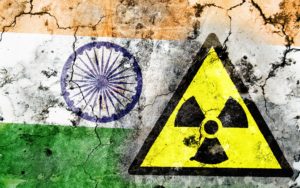by Uzge A. Saleem 26 July 2018
Nuclear weapons are a grave reality and probability of the nuclear war is one of the world’s worst nightmares. There are conflicts in the world at present that are on the tip of a nuclear breakout. Given these facts, it is crucial to evaluate at this point whether the deals that are made and the fashion in which the nuclear material is being handled currently can prove to be positive in the future or not.
The Indo-US nuclear deal is a civil nuclear deal, but this is just the tip of the iceberg. Despite the fact that it has de Jure civil deal status, it is no secret that India’s weapon production has increased manifold since this deal was signed which cannot be a mere coincidence. Technically speaking the Nuclear Spent Fuel is what is being brought into use to avoid any breach of the agreement. The nuclear-spent fuel is a by-product produced in the nuclear reactors, by undergoing certain processes it can be turned into Plutonium which can be used in nuclear weapons. Now the material being supplied to India may be used for civil purposes but its by-product can and probably is being used for other reasons. This puts the non-proliferation regime, especially NSG into a tight spot. Usually, IAEA comes in handy under such circumstances but the military nuclear facilities of India do not come under the jurisdiction of IAEA. This is a question mark on not only the safety and security of India’s nuclear facilities but also on the credibility of intentions of Indian officials to keep the use of nuclear material peaceful. One thing can be proven correct given these facts, proliferation is inevitable. This statement can be given based on the fact that if the superpower and the guardians of Global Security and Stability are signing such deals with such a nation and providing them with opportunities that are most definitely upsetting the security equilibrium of the South Asian region then they are contributing to proliferation of nuclear weapons as much as any other Non-NPT nuclear weapon state. The role of NPT needs to be kept in mind at all times, by all countries, in its true essence if the states want to head towards non-proliferation.
Currently, there are 15,000 nuclear warheads in the world out of which 80% deployed warheads have been removed by the US and Russia. China maintains minimum deterrence warheads which translates into the minimum number of warheads required for its security. For a long time now the UK, France, and China have maintained a number of warheads which implies that there is progress towards disarmament, but it is frustratingly slow. On top of that if these major powers start signing deals of nuclear nature without ensuring security check and balance with other states that the condition of non-proliferation efforts will deteriorate to dangerously low levels. The personal non-proliferation efforts of these states are visible, but their nuclear deals cancel out these efforts.
A new debate among the nuclear aspirants can be seen which now claim that NPT nuclear weapon states don’t disarm because they rely on their nuclear programs for security. The second leg of this debate is activated when they see the Non-NPT nuclear weapons states benefitting from trade with NPT nuclear weapon states they also want to become a part of this spree which then makes them believe that acquiring nuclear weapons would benefit them in the more extended run. The general image from these deals is that either they need to be on a non-discriminatory basis or they need to be banned for all. If they are to be signed, then one must stay vigilant of the fact that the nuclear material is strictly being used for civil and not military purposes.

